Wanna live life the best way it was supposed to be lived? Learn these Cantonese proverbs that will surely make every day of your life better.
We are all familiar with the basic way of giving advice to someone. But, way back past generations, there’s this one way that people used to teach lessons about everyday lives, and that is through proverbs.
Proverbs are traditional and insightful saying that is based on truth. These proverbs use figurative language that would be understood beyond their literal meaning. In the past few generations, proverbs have been used to give advice or lecture people, particularly children, about life. It is also used in preserving culture and traditions so it can be passed to future generations.
Even until these modern times, you can still hear proverbs used by parents to mold their children into becoming good people. From this, we can say that proverbs are really an essential part of a culture.
Every culture has its own set of proverbs. In this blog, we will learn about Cantonese proverbs, particularly Hong kong proverbs, that are commonly used by Cantonese families. Proverbs can also be an indicator to assess if you are really a native Cantonese speaker or you have a more profound knowledge of the Cantonese language and the culture behind it.
So, sit back and relax. This will be going to be long but worth it!
Proverbs And The Cantonese Culture
Cantonese proverbs, particularly Hong Kong proverbs, are essential in the Cantonese culture. They are not just some couple of sayings or phrases that are taught in Chinese language school to memorize. It tells more about Cantonese culture and the way Cantonese people should behave.
Hong Kong parents use Cantonese proverbs or Hong Kong proverbs to teach their children. If there’s a very naughty child, you’ll particularly hear the parents or adults saying Cantonese proverbs to them.
When it comes to Cantonese proverbs, there’s someone whose name could never be missed -Ah To (阿塗). He is a graphic designer and part-time cartoonist concerned about Cantonese’s survival in Canton and Hong Kong. He has lately published a comic called “The Great Canton and Hong Kong Proverbs” on Hong Kong independent media called “Passion Times.” 81 Cantonese proverbs are illustrated in the cartoon.
This cartoon about Hong Kong proverbs aims to propagate the Cantonese culture and defend the Cantonese language. It was inspired by the oil painting called “Netherlandish Proverbs” made by Dutch artist Pieter Bruegel. This painting portrays many dutch proverbs to give recognition to the Dutch culture.
Today, even in these modern times, Cantonese proverbs, idioms, and sayings are still used to give life lessons, especially to the young ones. This serves as one of their foundations on how to be a good person growing up. A person without a foundation might end up being lost when they grow up. With the good Hong Kongers, you’ll meet when they go to their country, you’ll say that these proverbs have reached their goals.
Hong Kong Proverbs, Idioms And Sayings
Cantonese Proverbs, sayings, and idioms are simple and brief wording that convey folk wisdom. It is widely known by ordinary local people because it has always been an essential part of their culture growing up. Cantonese proverbs are usually told by parents and other senior family members to guide children in their lives. Preserving these Cantonese proverbs is also a way of preserving their culture.
If you want to speak Cantonese and sound like a native, collect Cantonese proverbs like what you’ll read below. Aside from Cantonese proverbs, you will also learn Cantonese idioms and sayings that have been around for the past few generations.
If you’re just beginning to learn the Chinese language like Cantonese, do not worry because all the Cantonese words written in Chinese characters that you’ll encounter have English translations and romanization. So, let’s not wait for any further and learn these Cantonese proverbs.
上山捉蟹 (Soeng5 Saan1 Zuk1 Haai5)
Literal Meaning: To catch crabs on a hill
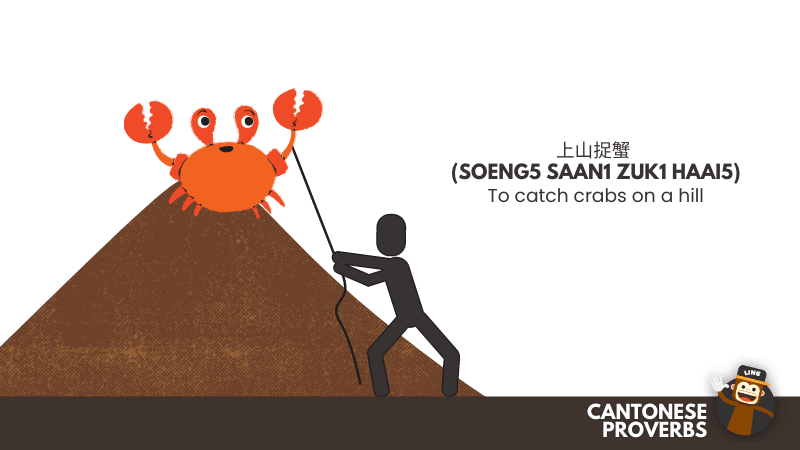
Meaning:
There are things in life that are you can hardly think would happen. In something like that, the Cantonese proverbs that you can use are “To catch crabs on a hill (上山捉蟹 Soeng5 Saan1 Zuk1 Haai5)”. It means “Almost impossible or Harder than hard.”
In life, there are things that we already know are impossible to happen, and we can’t do anything about it anymore. However, there are things that you thought were impossible to happen, but you’ll never know if you won’t try.
鬼揞眼 (Gwai2 Ngam2 Ngaan5)
Literal Meaning: A ghost covers one’s eyes

Meaning:
There are things in life that can’t be seen by the naked eye. Sometimes’ we look at things differently than others. We fail to notice the truth because we are sometimes blinded by the shallow things we see or the things that we only want to see.
The Cantonese proverb “A ghost covers one’s eyes (鬼揞眼 Gwai2 Ngam2 Ngaan5) means “To fail to see something.” This proverb teaches people to be critical of the things in their life. You have to look deeper at certain things because they might mean more than what you see. Opening your eyes to look deeper will make you a better person.
佛都有火 (Fat6 Dou1 Jau5 Fo2)
Literal Meaning: Even the Buddha gets inflamed

Meaning:
Have you ever experienced something intolerable? There are situations or even people that go way past their limitations that you can’t even take it anymore. This Cantonese proverb was influenced by Buddhism. It means “an intolerable degree that; past the limitations.”
Remember how Buddha maintains his patience to reach enlightenment? Well, how bad the things someone can do that even the Buddha can get inflamed (佛都有火 Fat6 Dou1 Jau5 Fo2)? This proverb teaches people to know their limitations and not go beyond them. Knowing your limits will save you from affecting other people in a negative way.
呃鬼食豆腐 (Aak1 Gwai2 Sik6 Dau6 Fu6)
Literal Meaning: To trick a ghost into eating tofu

Meaning:
This is one of the very timely and relevant Cantonese proverbs today. The proverb “To trick a ghost into eating tofu (呃鬼食豆腐 Aak1 Gwai2 Sik6 Dau6 Fu6) means “to trick someone.” Now that scams, phishing, catfishing, and other ways of tricking others are prevalent, this might be one of the essential Cantonese proverbs that you should learn.
Tricking someone for personal advantages, even if it’s only a prank, is really not a good thing to do. These small tricks might lead to bigger consequences and problems that can cause harm to other people. Today many people fall for tricks and end up hurting or losing something significant in their lives. It’s really bothering that people nowadays can easily trick anyone even they know how awful it can be.
放飛機 (Fong3 Fei1 Gei1)
Literal Meaning: To throw a paper airplane

Meaning:
I’m sure many people will agree that broken promises are one of the worst and most painful things in life. In Cantonese proverbs, they use “To throw a paper airplane 放飛機 (Fong3 Fei1 Gei1) ” that which “to break a promise”.
We should remember that keeping our words is important to avoid hurting other person’s feelings. When it is broken, even sorry means nothing. It teaches people to hold on to all the words and promises they make.
牛唔飲水唔撳得牛頭低 (Ngau4 M4 Jam2 Seoi2 M4 Gam6 Dak1 Ngau4 Tau4 Dai1)
Literal Meaning: If a cow doesn’t want to drink, you can’t force its head down.
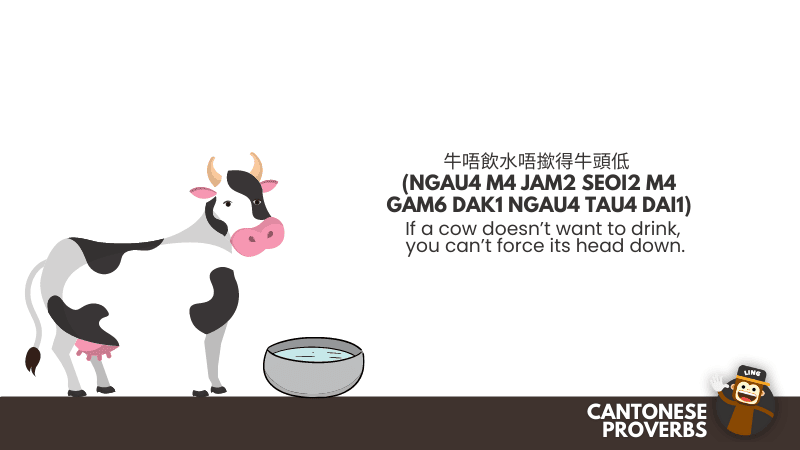
Meaning:
Each individual is accountable for their own acts. Even if you give them advice, there’s no guarantee they’ll follow it. In English, this is the Cantonese proverbs version for “You can lead a horse to water, but you can’t make it drink.”English.
People do not always need advice from you when they’re going through something. Sometimes being there to listen to them is all they need to feel better. You don’t always have to say sometimes because it might just make everything worse.
刀仔鋸大樹 (Dou1 Zai2 Geoi3 Daai6 Syu6)
Literal Meaning: Use a little knife to saw down a tree.

Meaning:
Hong Kong is one of the Asian Tigers, and we cannot deny the fact that it’s one of the countries where you can get lots of career opportunities. The Cantonese proverb 刀仔鋸大樹 Dou1 Zai2 Geoi3 Daai6 Syu6) can be very useful, especially if you want to pursue a Career in Hong Kong. This proverb means “using a small amount of capital to earn a large profit.”
When you’re starting a business, things can be too risky, so you’ll really have to be critical and think of a way that you can make a large profit out of a small capital. There are lots of big companies today that started small and worked their way up to the top.
玻璃夾萬 (Bo1 Lei4 Gaap3 Maan6)
Literal Meaning: A glass safe
Meaning:
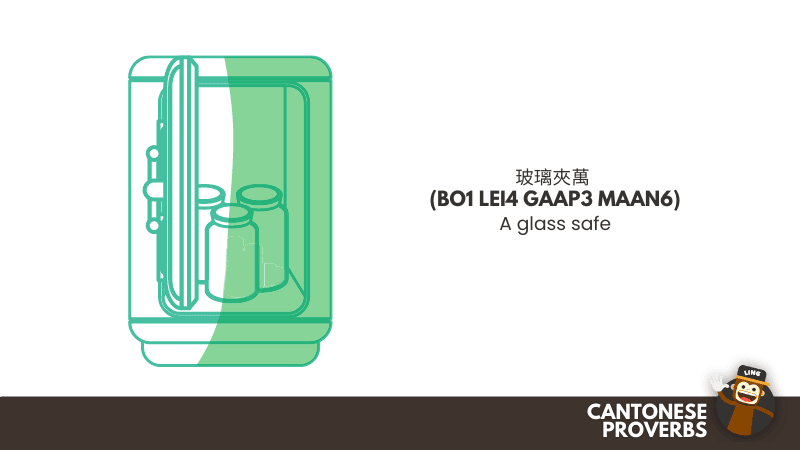
In these modern times, there are lots of things that look really nice but totally worthless. To describe these things in Cantonese proverbs, use “A glass safe (玻璃夾萬 Bo1 Lei4 Gaap3 Maan6)”. It means “something that appears attractive but is not useful.”
This proverb is a reminder that not everything that looks nice is essential. Like what was mentioned in the novel “The Little Prince,” what is important is invisible to the eye.
馬死落地行 (Maa5 Sei2 Lok6 Dei6 Hang4)
Literal Meaning: When one’s horse dies, one has to walk
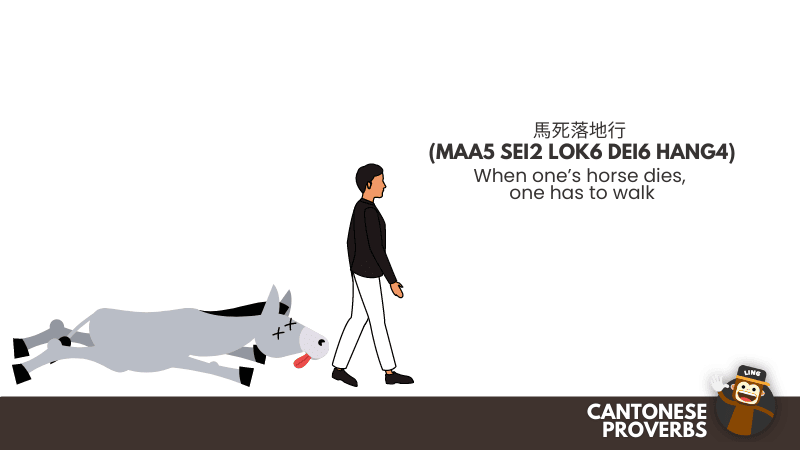
Meaning:
This Cantonese proverb means “to have to rely on oneself and get through a difficult situation without assistance.” Cantonese family is really important in their culture. But, as a child, you really have to learn how to stand on your own feet. Your family will not always be there for you forever.
豬籠入水 (Jung4 Jap6 Seoi2)
Literal Meaning: Water enters a pig basket
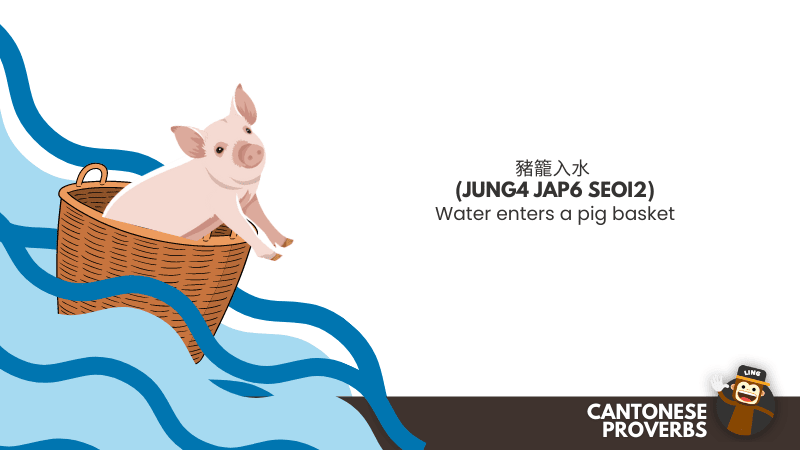
Why do you think there are lots of billionaires from Hong Kong? Well, they definitely know lots of ways to make money. The Cantonese proverb to use for this is “Water enters a pig basket (豬籠入水 Jung4 Jap6 Seoi2) which means “to have many different ways to make money, to have money coming from many different enterprises or sources.”
More Cantonese Proverbs, Idioms, And Cantonese Sayings
The Cantonese proverbs, sayings, and idioms that you have learned above are only the basic ones. If you wanna learn more about Cantonese proverbs, idioms, and sayings, check out the tables below.
Cantonese Proverbs And Sayings About People
Cantonese Proverbs, Idioms, And Sayings About Animals
Cantonese Proverbs Idioms, And Sayings About Ghosts
Cantonese Proverbs Idioms, And Sayings About Food
Other Cantonese Proverbs, Idioms, Sayings
Learn The Cantonese Language Now
Cantonese proverbs are just one of the interesting things in the Cantonese language. There’s so much to discover and learn. So, if you want to learn more Cantonese but don’t know how to start, Ling App is the perfect tool for you.
Ling App is a language learning platform that helps learners like you learn their desired language, like Cantonese. The Cantonese language is indeed one of the challenging Asian languages to learn, but Ling App’s features help you develop the skills that are essential in learning. It has fun mini-games to learn and practice vocabulary, dialogues to practice your speaking skills, and even grammar explanations to help you understand structure.

Backed with linguistic research and made by actual language experts, Ling App can surely help learners like you achieve their learning goals in record time. So, start your first Cantonese lesson with Ling App now!




































































2 Responses
There was an old saying I heard until the late 1950s something like; sik si, aw fan’ meaning eat shut, shut rice. It was equivalent to ‘ what goes around, comes around’ & refers to using nightsoil to fertilise crops. I can never find it these days
What does “walked over by a ghost” mean?
Thank you